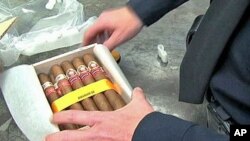In September, President Barack Obama extended a decades old embargo against Cuba. In place since the 1960s, the embargo prohibits U.S. citizens and companies from trading with Cuban companies and purchasing Cuban products, including the popular Cuban cigars.
The U.S. Customs and Border Protection agency, however, has seen a dramatic increase in the amount of contraband cigars being sent illegally to the United States. They arrive at the International Mail Facility at Chicago's O'Hare airport by the thousands each day. Boxes, envelopes, and packages from foreign countries, sent to destinations throughout the United States.
Customs and Border Protection officers like David Radzicki inspect each package - looking for anything unusual. Ticking off a list of various things to watch for, Radzicki said, " ... narcotics ... anything related to terrorism, and anything related to immigration violations."
Since November, thousands of packages have not been reaching their intended recipients. That's because they are filled with dozens, even hundreds, of Cuban cigars. Under the 1962 U.S. trade embargo against Cuba, they are illegal, and are seized.
"It is against the law for a United States citizen to purchase, consume, import any Cuban products from anywhere in the world," said Brian Bell, the Public Affairs liaison with the U.S. Customs and Border Protection agency. "It's a prohibited item, and therefore it can be desirable. Cigar aficionados say the Cuban cigars are the best in the world."
Officers began seizing large volumes of cigars in mid-November. Since then, Bell said, they have confiscated more than 100,000 cigars. The number continues to rise as more packages arrive daily.
"We've never seen anything like it ever before," said Radzicki. "I know our management talked to other ports, and other ports haven't seen anything like it before. So we were all pretty surprised at the extreme volume we saw."
"One cigar can go for as much as $5 all the way up to $55, and that is for one individual cigar," said Bell.
Bell said the increase in contraband filtering through Chicago is due in large part to new security regulations - put in place in the wake of attempted terrorist attacks, which used explosives hidden in printer cartridges.
"Anything that weighs over sixteen ounces or one pound is prohibited from being flown on a passenger aircraft," said Bell.
Many cigar shipments used to find their way to the U.S. as cargo on passenger aircraft. With the new restrictions in place, those cigars have to fly on cargo planes.
Few, if any, of the cigars come to the U.S. directly from Cuba. Bell said most are purchased from Swiss companies that incorrectly claim they can export them to the United States. Many European cargo aircraft fly to Chicago's O'Hare airport, where agents like Radzicki intercept the cigars.
"People want them," said Radzicki. "As long as there is still an embargo I think people are going to find a way to get them, especially with the Internet. It makes it a lot easier."
Instead of the cigars, the intended recipients receive a notice from Customs and Border Protection outlining why the cigars were seized. The contraband items are then stored in a secure facility before they are destroyed.
"They are all going to be destroyed in a blast furnace," said Bell. "Contrary to popular belief, they are not going to be smoked individually. They're not going out as Christmas gifts. We have very strict security measures in place to ensure that everything that comes into this facility that is prohibited is also destroyed."
There are consequences to importing illegal cigars. Repeat offenders and businesses attempting to resell the contraband could face fines up to $55,000 if convicted, and in rare circumstances, could face imprisonment.





